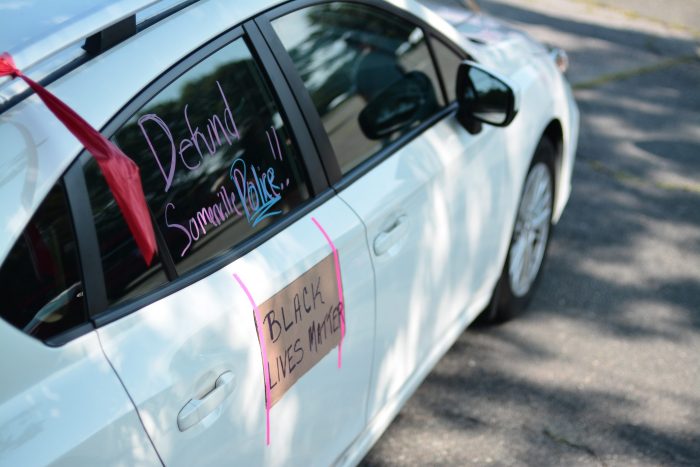Photo by Ariel DiOrio
Activists and politicians agree there has to be reform, but differ on details
(Somerville Wire) – Reimagining the police system in Somerville has been the project of political leaders, activists, and community members across the city—in the wake of the acts of violence and racism that have shaken the country. For some, it is a matter of creating a structure of checks and balances, while for others, the entire existential notion of the role police officers play must be reinterpreted and perhaps even overturned. Policing in Somerville is still built upon practices of oppression and discrimination, targeting people of color, while the force continues to benefit from an uneven distribution of power.
“There is the overlording thing,” said Ben Echevarria, executive director of the Welcome Project. “I talk to Mystic residents, and they talk about how the housing police drives through these neighborhoods at three miles an hour, and it feels like they’re staring, as they’re driving by you.” He added, “Just the creation of the police force comes from a system of racism. We see it. We see the white woman in the park, calling the cops on a Black man who jogged by her or was grilling. …We have a system that continually perpetuates and hides things, and on top of it all, you have citizens who call and make some of these cases.”
For Echevarria, even if the police system is restructured, there will still be a need for some kind of enforcing arm. He stated that it would be important to find a place for social workers, who could respond to issues such as mental health crises or school related problems, but that these people could be trained in policing.
“They would become the officers,” said Echevarria. “You call them whatever other name you want.” He added, “If you got rid of policing all together and said, ‘all we have are social workers,’ then social workers would be responsible for upholding the law. You’re just calling policing by a different name. There would be a lot of loopholes that would need to be figured out. But a portion of policing needs to be social workers and medical professionals. One of the barriers would be that most social workers have a master’s. So diversity would become an issue. …They would just become the police, and they would do these things. They would be the ones who would issue tickets and pull people over. They would be the ones who are going to the crime scenes.”
Echevarria also pointed out that it currently takes six months for a person to train to become a police officer. He explained that Somerville should have a more educated police force, requiring a two-year degree that could count towards a college education. While Echevarria said that he believes taking money out of policing would hurt programs that help impacted people, many political figures in Somerville believe that it is necessary to reassess the budget.
One of these individuals is Eve Seitchik, candidate for Somerville City Council and former co-chair of the Boston Democratic Socialists of America (BDSA). Seitchik said that they were particularly struck, as a trans and queer-identifying person, when at a peaceful counter protest to the “Straight Pride Parade” held in 2019, Somerville police tackled and arbitrarily arrested their friends and fellow activists, confirming for Seitchik that change in the police system was necessary. As a candidate, Seitchik is hoping to cut the police budget by at least 10% per year, reallocating funds to support non-violent mental health response, affordable housing, safe injection sites, and other social services. They added that in Somerville, there are very rare and few cases of violent crimes where it would be absolutely necessary to bring in armed enforcement, and for cases of domestic violence and mental health crises, it would make more sense to have a social worker or similar types of responders come in. Seitchik said that they envision a world where a police force plays a much smaller role.
“If we’re talking about a long term horizon, where our society could be a different type of place, where we have green jobs and a real social safety net… my horizon is a world without policing as we currently understand it,” said Seitchik. “That’s not going to happen tomorrow, and I think there are definitely difficult questions about what is this world, and what does the response look like if somebody, for whatever reason, does an armed bank robbery? I think the way that some sort of armed force that would respond to that—that needs to exist, but it wouldn’t resemble the police as we currently understand them, as a powerful, armed force that’s very visible, that’s all over our society, that criminalizes poverty in our most vulnerable communities, that provides constant surveillance. If you start to take away all those aspects of what makes the police the police, eventually, they’re not the police. We have this very small part of our society, that’s dealing with very rare, violent occurrences.”
Tessa Bridge, who is also a candidate for city council and a member of BDSA, said that by investing in social services, a society can address the root causes of crime, rather than perpetuating a system that responds in a punitive way.
“The majority of engagements with the justice system are related to mental illness or poverty,” said Bridge. “They’re not violent crimes. …The vast majority of police responses are to nonviolent incidents. We know that our structures force people, particularly folks of color, into poverty, that we have a real lack of mental health supports, we have issues of housing that result in a high population of unhoused people. And those folks are running into a justice system that is militarized and that is carceral. To me, that is not the response we need. …We need life affirming institutions that center people who are most impacted and that are really grounded in community health and wellness.” She added, “When there is resistance to defunding the police, often that is coming from a place of fear, that something is going to happen, and that I’m going to need help, and no one is going to be there for me. Of course, that is a frightening concept, and what I try to say to people is, this is going to take time to build a different structure. We can imagine a different way, where you get the supports you need and that we are serving our community in a community health and wellness focused way.”
A founding member of Defund SPD, Matthew Kennedy said that he would like to see the entire framework of policing change, calling for the eventual formation of a city that would not need police. He added that he would hope for a larger cut from the police budget than 10% per year.
In a letter to the city council, written in January, Somerville Police Chief Charles Femino outlined specific divisions that officers are active in, including the traffic division, family services, and the narcotic/gang division. Looking at the letter, Kennedy said that these are areas that do not necessarily need to be handled by people with guns or handcuffs. Furthermore, Kennedy said that anti-racism training and bringing greater diversity to the police force are not always effective ways of reducing police brutality.
“If you’re providing people with their basic needs, then the likelihood of them even wanting to decide that they’re going to hurt somebody else is not going to really be there,” said Kennedy. “But if you’re saying that even when people still have their home, education, and food, they’re still wanting to become violent… we [could] have some other type of rapid response that wouldn’t show up with a gun. …It would be a different kind of community response that would be localized and depend on what is needed in that situation. We don’t want to be responding to violence with more violence.”
Jessica Brayden, chief executive officer of RESPOND Inc, an organization working to end domestic violence, said that while RESPOND does not have counselors embedded in the Somerville Police Department, their collaborations with police departments in six different departments in Massachusetts have been beneficial. However, she emphasized that domestic violence cases are by nature unsafe and often volatile situations, and to intervene on the ground, a social worker would need to have a different set of skills than most currently have.
“As a resident of Somerville, I would be very concerned about sending social workers out into dangerous domestic violence situations, without some kind of support,” said Brayden. “We can look at deeper partnerships and different partnerships, but sending people out to dangerous situations who aren’t trained for them, especially in domestic violence, when one person is intent on power and control over another, seems very scary to me.”
Councilor Will Mbah said that the City has taken steps in the direction of reimagining policing, with a ban on tear gas and the development of a civilian oversight agency, but that there is still a ways to go. Mbah said that the budget should be reassessed and that the City should find ways to fund other needs, such as mental health services. Essential to the process is rebuilding hope and trust among civilians, said Mbah. He said that he does not know if it is possible to create a society where police do not exist, but that there needs to be a change in the mentality that traces back to the police force’s origins as a slave-catching entity.
“We need some kind of alternative,” said Mbah. “[It would involve] some form of increasing mental health counselors. That means the counselors have to be diversified, so that they look like the population that they’re serving.” He added, “We live in a society that is built on racial hierarchy and subjugation. This is just one battle in that structure or institution.”
All Somerville Wire articles may be republished by community news outlets free of charge with permission and by larger commercial news outlets for a fee. Republication requests and all other inquiries should be directed to somervillewire@binjonline.org.
Shira Laucharoen is assistant director of the Boston Institute for Nonprofit Journalism and assistant editor and staff reporter of the Somerville Wire.





